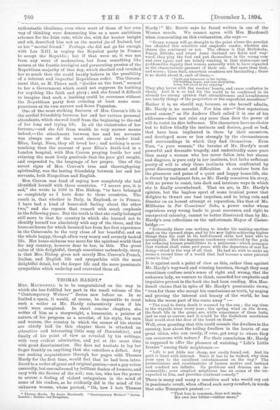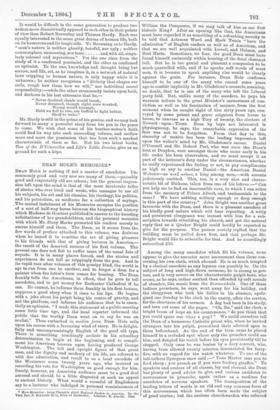THOMAS HARDY.* Mus. Maonowunn is to be congratulated on the
way in which she has fulfilled her part in the small volume of the " Contemporary Writers" Series now before us. In so limited a space, it would, of course, be impossible to treat such a writer as Mr. Hardy exhaustively even if his work were completed. In short concise chapters, she writes of him as a storywright, a humourist, a painter of nature, of his progress as a novelist, of his style, his men and women, the country in which the scenes of his stories are chiefly laid (to this chapter there is attached an attractive and interesting little map of Dorsetshire), and finally of his point of view as revealed by his writings, with very evident admiration, and yet at the same time with great discrimination. She does not hesitate to lay her finger frankly on anything that she considers a defect. Any one making acquaintance through her pages with Thomas Hardy for the first time, would feel that he had been intro- duced to a writer of great and original genius,—not a gay writer assuredly, but one enlivened by brilliant flashes of humour, and racy with the flavour of the soil ; one, too, who has the power to arouse a feeling of violent antagonism in the mind of some of his readers, as he evidently did in the mind of the unknown woman, whose protest, " Oh, how I hate Thomas • llama! Hardy. 13y Annie Idaedonell. "Contemporary Writers"' Series. London : Hodder and Stoughton. Hardy !" Mr. Barrie says he found written in one of the Wessex novels. We cannot agree with Mrs. Macdonel) when commenting on this exclamation, she says :— " Every woman will go straight to the point where the novelist has offended this sensitive and emphatic reader, whether she shares the sentiment or not. The offence is that Bathsheba, Panay, Elfride, and sweet Anne Garland are fickle and way- ward, they play the fool and put themselves in the wrong over and over again, and are totally wanting in that statuesque and goddess-like dignity that women naturally wish to have regarded as the characteristic garment of their sex. But more than that, and worse ; these frail, uncertain creatures are fascinating ; there is no doubt about it, each of them,— 'Light and humorous in her toying,
Oft-building hopes, and soon destroying, Long, but sweet in the enjoying.'
They play havoc with the readers' hearts, and cause confusion in ideals. And it is so bad for the world to be confirmed in its already too strong opinion that attractiveness and loveableness are hardly things of the proprieties or the superficial moralities:''
Rather it is, we should say, because, as she herself admits, Mr. Hardy is no moralist. For him sin—" that mysterious moral cancer," as Sir Andrew Clark called it in one of his addresses—does not exist any more than does the power of will to resist its dire influence. His characters have no choice but to follow blindly the instincts and desires, good or bad,.
that have been implanted in them by their ancestors, and developed more or less strongly by the circumstances and surroundings in which they find themselves. Even Tess, " a pure woman," the heroine of Mr. Hardy's most powerful and dramatic tragedy, and undoubtedly more pure than many a woman who has never fallen into her shame and disgrace, is pure only in her instincts, but lacks sufficient purity of will to obey those instincts when confronted by great discouragement and difficulties. A creature born for the pleasures and pains of a quiet and happy home-life, she is thrust by malignant fate, as Mr. Hardy conceives his story, with no power to resist, into dark and intricate ways in which she is finally overwhelmed. That we are, in Mr. Hart's opinion, but the hapless sport of some ironical power that delights to thwart our best impulses, and to bring ruin and disaster on an honest attempt at reparation, like that of Mr. Millborne in For Conscience' Sake, a power under whose capricious sway wrong leads to great successes, and right to unexpected calamity, cannot be better illustrated than by Mr. Hardy's own reflections on the unfortunate Mayor of Caster- bridge :— " Externally there was nothing to hinder his making another start on the upward slope, and by his new lights achieving higher things than his soul in its half-formed state had been able to accomplish. But the ingenious machinery contrived by the gods for reducing human possibilities to a minimum—which arranges that wisdom shall come poi passu with the departure of zest for doing—stood in the way of all that. He had no wish to make an' arena a second time of a world that had become a mere painted scene to him."
It is against such a point of view as this, rather than against Mr. Hardy's wayward and winning heroines, though they may sometimes confuse men's sense of right and wrong, that the unknown lady, we venture to think, recorded her emphatic and impulsive protest in the book she had been reading. Mrs. Mac- donell claims that in spite of Mr. Hardy's pessimistic views, "even for those who accept his conclusions as truth, by urging and proving the interest and beauty of the world, he has taken the worse part of the curse away " The road to dusty death is warmed by the sun ; the sap rises, in the wayside trees every year ; the spring wind on the down, the fresh life in the grass, are, while experience of them lasts, just as real as sorrow, and it would be the foolishest asceticism that would shut the door of the heart on them."
Well, even granting that this could console the dwellers in the country, how about the toiling dwellers in the hearts of our, great cities, who can rarely, if ever, get away to where they can commune with nature P For their consolation Mr. Hardy, is supposed to offer the pleasure of watching " Life's Little Ironies " among their neighbours :- " Life is not little nor cheap, nor easily found out. And its path is lined with interest. Since it has to be walked, why shut your eyes to the excellent entertainment on the way P The permutations and combinations of human motive and instinct and conduct are infinite. Its problems and dramas are in- numerable ; your simplest neighbour has an ocean of the un- expected in him, and provides continual comedy."
There is many and many a sensitive soul who would cry out- in passionate revolt, when offered such sorry comfort, in words, that echo Tennyson's protest :- " That loss is common, does not make My own less bitter—rather more." It would be difficult in the same generation to produce two writers more diametrically opposed to each other in their points of view than Robert Browning and Thomas Hardy. Each was equally interested in the same great drama of human life, both on its humorous and its tragic aide. To Browning as to Hardy, " man's nature is neither ghastly, hateful, nor ugly ; neither commonplace, unmeaning, nor tame and with all, singu- larly colossal and mysterious." Yet the one rises from the study of it a confirmed pessimist, and the other as confirmed an optimist. To the one, knowledge and thought bring but sorrow, and life, set, as he imagines it, in a network of natural laws crippling to human nature, is only happy while it is unknown; he neither recognises a "divinity that shapes our ends, rough hew them how we will," nor individual moral responsibility ;—while the other strenuously insists upon both, and declares in his last utterance that he,— " Never doubted clouds would break, Never dreamed, though right were worsted, Wrong would triumph, Held we fall to rise, are baffled to fight better, Sled to wake."
Mr. Hardy is still in the prime of his genius, and we may look forward to many a powerful story from his pen in the years to come. We wish that some of his brother-writer's faith could find its way into each succeeding volume, and mellow more and more the pessimism that has been such a marked characteristic of them so far. But his two latest books, Tess of the D'Urbervilles and Life's Little Ironies, give us no ground for such a hope.



















































 Previous page
Previous page